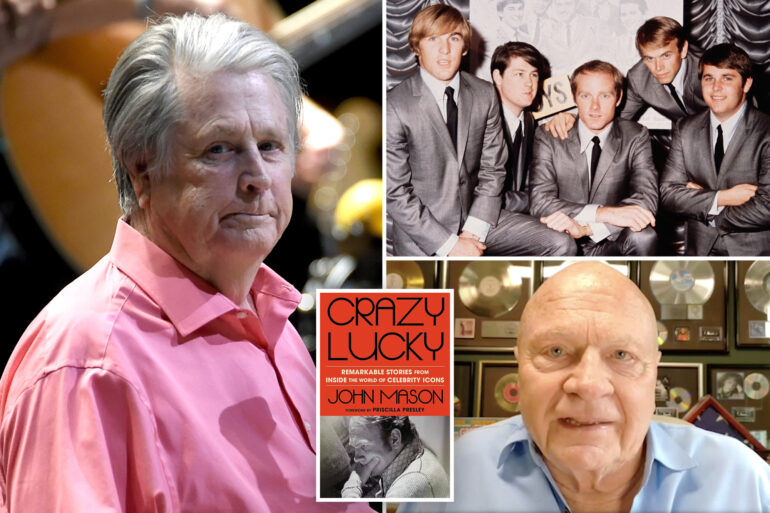🔴 Website 👉 https://u-s-news.com/
Telegram 👉 https://t.me/usnewscom_channel
John Mason knew that Brian Wilson needed help – but it came at a high price.
“Brian was in a weak mental state,” the entertainment lawyer, who once represented the fragile leader of the Beach Boys, told Fox News Digital.
“Brian often said to me, as sad as it sounds … ‘I fried my brain. I took too many drugs.’ Brian couldn’t get up in the morning without somebody getting him up. He couldn’t eat healthily without somebody giving him something healthy to eat.”
“So, the good and bad of Dr. Eugene Landy in Brian’s life was that he motivated Brian to become a participant in his own life,” Mason shared. “But the bad part was that, as time went by and years went by, Dr. Landy expected more and more to replace Brian in the Beach Boys… Brian wasn’t allowed to do anything without a Landy handler being with him.”
Mason, who has worked with Roy Orbison, Reba McEntire, Shakira and Quincy Jones, among others, has written a new memoir, “Crazy Lucky.”
It explores what it takes to defend the famous during career-defining moments.
The book delves into Wilson’s relationship with Landy, a psychotherapist accused of holding a Svengali-like power over him. Mason said it led to one of the singer/songwriter’s biggest regrets.
“Mike [Love] and Carl [Wilson] came into my office and said to Brian, ‘Hey, we have the opportunity to write a song for this movie, [1988’s] ‘Cocktail,’” said Mason.
“’It’s going to be starring Tom Cruise. It’s really great. We’d love you to join us. And Brian was really excited. He said, ‘Oh, I’d love to do that.’ But later in the evening, Brian called and said, ‘I shouldn’t do that. Dr. Landy said I shouldn’t do that. Well, that turned out to be ‘Kokomo,’ the biggest hit the Beach Boys had had probably forever. And Brian felt really badly about not working on ‘Kokomo.’”
“When he heard it, and when I heard it, we went, ‘Oh my gosh, was that a missed opportunity?’” Mason recalled.
Mason wrote that Landy refused to let Wilson participate unless he, too, were listed as a writer on the song. However, Carl and Bruce Johnson, along with Love, refused. They went on to write “Kokomo” without Wilson’s input. It was a decision that Wilson deeply regretted over the years.
“Brian is truly a giant teddy bear and genius who regrets bad decisions and lives for better ones,” wrote Mason.
According to Mason’s book, Wilson’s struggles began in 1968, when he quit performing and devoted himself to songwriting instead. While Wilson was determined “to make the greatest music,” his mental health began to deteriorate.
Mason wrote that Wilson’s experiments with drugs, specifically LSD and cocaine, had “diminished his mental capacity.” He rarely left his bed and, according to reports, would go without brushing his teeth or showering for weeks.
“He eventually became so bizarre that he would sit at the piano in his living room surrounded by actual sand that had been dumped in big piles in a sort of playpen,” Mason wrote.
“He was forsaking his young family — wife Marilyn Rovell, a singer with the group the Honeys, and young kids Carnie and Wendy — for his strange kind of creative peace. Four years passed, and he never left the house. His weight ballooned to 350 pounds from eating entire birthday cakes as a late-night snack.”
In 1975, a “devastated” Marilyn brought in Landy, a psychologist known for his unconventional 24-hour treatment of celebrities. Wilson, who reportedly feared being committed to a psychiatric hospital, completely surrendered. Their first session took place in Wilson’s bedroom closet, where the artist felt safe, the Los Angeles Times reported.
Landy was successful. He padlocked Wilson’s fridge, put the star on a diet and shooed away drug-enabling pals, The Telegraph reported.
“Dr. Eugene Landy [helped] Brian overcome his fears of everything,” Mason told Fox News Digital. “I would call it an agoraphobia. . . . He feared going outside. . . . And he needed outside help.”
Landy’s strict methods worked. But in 1976, Landy was fired over a dispute involving fees, the Los Angeles Times reported. When Wilson was regressing into drugs and obesity, Landy was rehired six years later, the outlet shared. The 24-hour therapy resumed from 1983 to 1986. Landy said he was paid $35,000 a month.
And as Wilson began recording and playing live again, Landy was a constant shadow looming over him. Manager Tom Hulett, who knew that Mason was friendly with the Beach Boys, suggested that he could be “a strong, independent balance.” In 1984, Mason was hired.
“I was asked . . . if I would be Brian’s lawyer, and I agreed,” said Mason. “At that time, Brian was, I think, doing better, but he had a lot of issues. . . . Brian came to my office at least once a week. We started having Beach Boys meetings at my office once a month, and we all insisted that Brian come to those meetings without Landy.”
“Brian was my client. . . . [But] Brian did check in with Landy after our meetings, after our phone calls. Too often I would get a call back from Brian saying, ‘I know I said that, but I have to change my mind.’”
Mason wrote that Landy was eager to insert himself into every part of Wilson’s life. Wilson was controlled by both prescription drugs and the “Landy handlers” who “secretly or openly recorded everything Brian and anyone else said” for the doctor.
No decision was made without Landy’s approval, leaving Mason bewildered and frustrated.
“Ultimately, it led me to say to Brian, ‘I can’t work with you if Dr. Landy is in a position to change your mind or to second-guess me,’” said Mason. “And he said, ‘I understand that.’ But then, Dr. Landy called me and said, ‘You told Brian that he can’t work with me … so you are fired.”
“That’s a shame, but that is the kind of control Dr. Landy had over Brian Wilson,” said Mason.
After Mason was fired in 1990, Landy continued to tighten his grip. At one point, he was co-credited as a songwriter on several tracks. Wilson was “an obsession” to Landy, Mason wrote.
But in 1991, the Wilson family took legal action to appoint an independent conservatorship. The goal was to stop Landy from further influencing Wilson both personally and financially, the Los Angeles Times reported. In 1992, Landy was barred by court order from contacting Wilson.
“The court ordered Landy to disassociate from Brian,” said Mason. “Ultimately, Landy’s license to practice psychotherapy in the state of California was revoked. And Brian’s second wife, Melinda, was able to keep Brian motivated to perform.”
“He did a lot of shows,” said Mason. “He wrote songs, he did a lot of work. His health seemed to be pretty good. I saw Brian a number of times after I wasn’t his lawyer, and he looked good. He felt good. He was in a good mental state.”
Landy passed away in 2006 at age 71. Wilson died in June of this year. He was 82.
In his lifetime, Wilson admitted he didn’t entirely regret his association with Landy. Mason doesn’t either.
“I have to say that, in Brian’s case, I don’t think there was a better outcome,” Mason explained. “Had Landy not become involved, Brian would have become an ineffective vegetable. He was taking too many drugs and couldn’t find focus.”
“I don’t think that, at that point, back when Landy came in, either Brian’s ex-wife Marilyn or his daughters were able to motivate him to be independent. Drugs and alcohol have led to the demise of too many people. Many people we see end up dead from the process.”
“Saving Brian’s life probably necessitated a Eugene Landy who could come in and force him to take control of himself,” Mason continued. “I think they were the best years of his health, but the worst of his years with Dr. Landy.”

